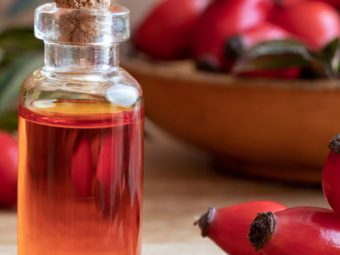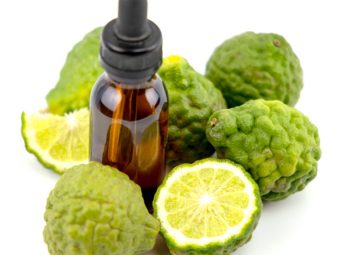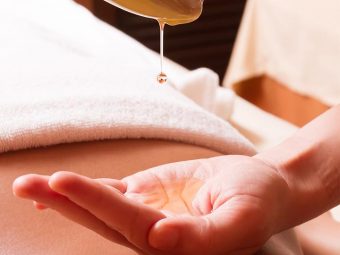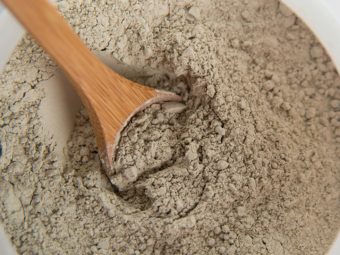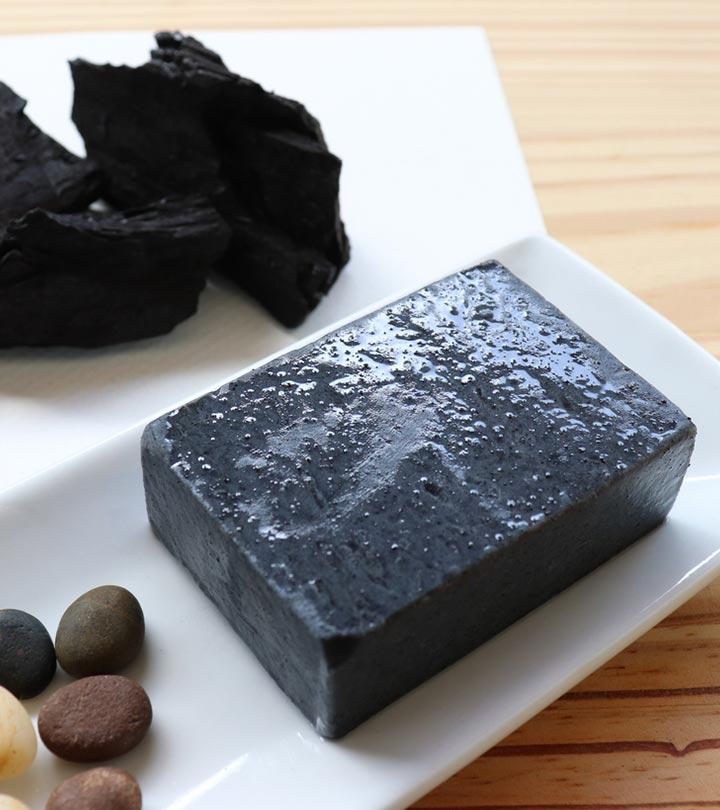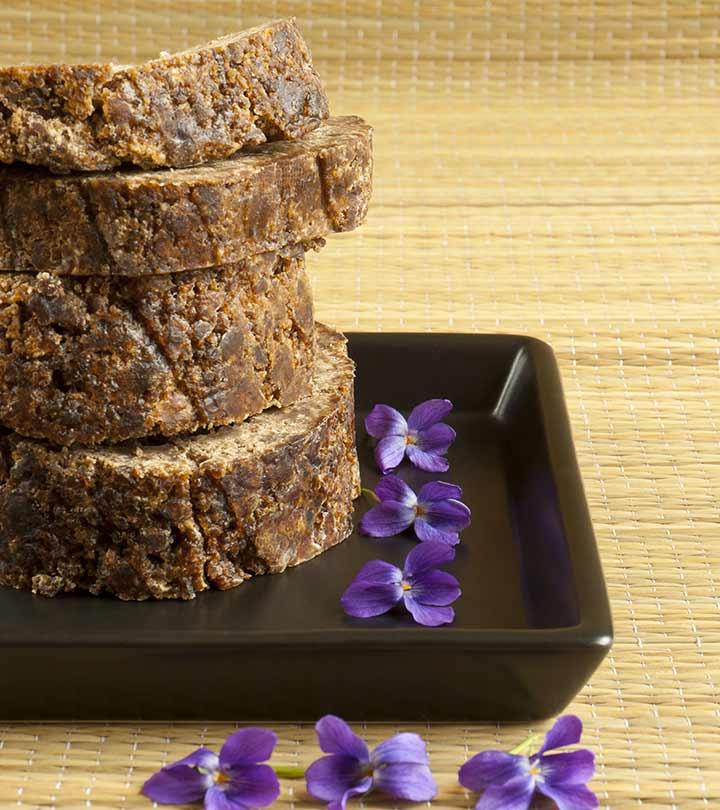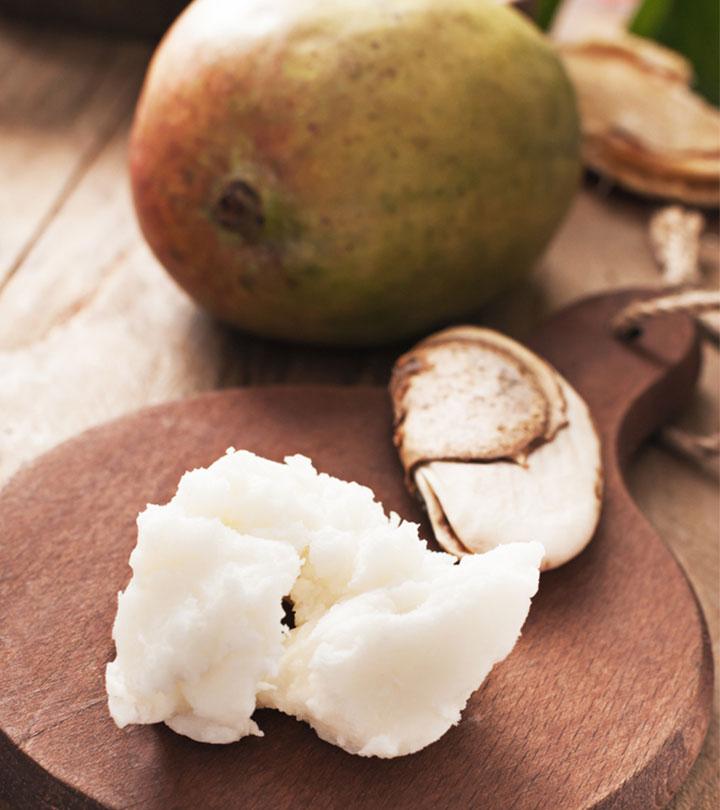Essential Oils For Eczema: Benefits, How To Use, & Precautions
Nature's balm, your body's ally: Embracing a holistic approach to reclaim your skin confidence.
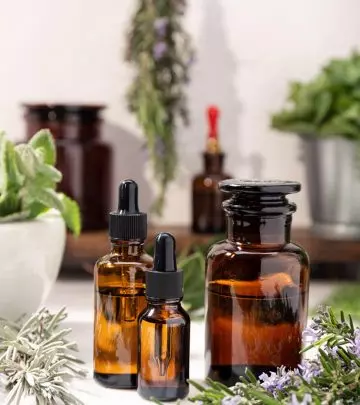
Image: Shutterstock
Eczema is a chronic skin condition that makes the skin dry, flaky, and itchy. It cannot be cured. However, you can manage the eczema symptoms with proper treatment and alternative therapies. For example, many people use essential oils for eczema to soothe flare-ups.
While there is not enough scientific evidence to support the use of essential oils for eczema, it is best to understand how they work before using them. Keep reading to understand the proper usage, benefits, and associated risks of using essential oils.
In This Article
Can Essential Oils Help With Eczema? What Are The Benefits?
Essential oils may help in managing atopic dermatitis or eczema symptoms. In the Australasian Journal of Dermatology published in August 2020, a study highlighted the prevalence and management of atopic dermatitis (AD) in Australian general practice. Among 2.1 million patients from 494 general practices, the lifetime prevalence of AD stood at 16.4%, with a higher incidence in females (17.3%) compared to males (15.3%). Topical corticosteroids were the most commonly prescribed medication (36.5%) for AD, while systemic corticosteroids (15.6%) were more prevalent than other immunosuppressants (0.9%). While there is not enough scientific evidence to prove their efficacy for eczema, a few of them may help soothe the symptoms. These essential oils have anti-inflammatory and antimicrobial properties.
Note: Essential oils are highly concentrated plant oils and are not regulated by the FDA. Many of them can irritate the skin and aggravate your condition. Hence, proceed with caution, do a patch test, and always consult a doctor before trying any alternative therapy.
Here are a few benefits of using essential oils for eczema:
1. May Have Antibacterial Effects
Eczema may lead to pathogenic skin infections and make your skin vulnerable to bacteria like S. aureus and Herpes simplex. Some essential oils may help eliminate bacterial infection and provide relief (1).
2. May Reduce Inflammation
Many essential oils have anti-inflammatory properties and may help soothe and maintain the skin. These oils also have wound-healing abilities (1). Hence, using essential oils may help minimize flare-ups by calming inflammation and promoting skin healing.
While essential oils may ease a few eczema symptoms, they may also aggravate the flare-ups and cause sensitivity. Lets take a look at the associated risks.
Risks Of Using Essential Oils For Eczema
1. May Cause Skin Irritation
Essential oils may cause allergic reactions and contact dermatitis. The skin barrier in people with eczema is already compromised. Using essential oils (particularly citrus oils) may cause redness, itching, and burning sensations.
2. Hormonal Changes
Essential oils are endocrine disruptors (2). If you have any endocrine disorders, using essential oils may lead to eczematous dermatitis and pruritus (itchiness) (3). If you have both, the oils may worsen your condition.
3. May Cause Toxic Reactions
Chronic exposure to certain essential oils may cause toxic reactions (2). Therefore, always consult a doctor before using essential oils for any skin issue.
 Did You Know?
Did You Know?In the next section, let’s look at the essential oils that may help soothe eczema symptoms.
Best Essential Oils That Are Safe And Effective
1. German Chamomile Oil
The topical application of German chamomile oil lowers the serum histamine level and reduces the frequency of scratching. It can help repair the skin barrier and has anti-inflammatory effects (4). It may help ease itchiness associated with atopic dermatitis (eczema) and soothe the skin.
Laura, a blogger, shared her experience of using chamomile cream for eczema. She mentioned her itching increased at night. She wrote, “At the moment, I often get an itch and a little patch of eczema on various parts of my hands, so I have a bottle of chamomile cream by my bed, and massage it into my hands at night, which helps calm and prepare me for sleep too (i).”
2. Tea Tree Oil
People with eczema are vulnerable to infections caused by S. aureus. Tea tree oil has antiseptic and anti-inflammatory properties and helps inhibit the growth of S. aureus (5). It also soothes the symptoms of contact dermatitis (6). It may help soothe itching and irritation caused by atopic dermatitis.
3. Pomegranate Seed Oil
Pomegranate seed oil contains a high concentration of phenolic compounds and has excellent antioxidant and anti-inflammatory properties. It contains linoleic and oleic acids that protect the skin (4). It may help soothe eczema flare-ups.
4. Eucalyptus Oil
Eucalyptus oil possesses antimicrobial and anti-inflammatory properties that may reduce inflammation, redness, itching, irritation, and swelling associated with eczema and prevent the occurrence of further flare-ups (1). However, further studies are warranted in this regard.
5. Lavender Oil
Lavender oil is not only ideal for aromatherapy and stress management but may also help in managing eczema. It exhibits anti-inflammatory activity that may help regulate the inflammatory response and combat oxidative stress. It may also help reduce anxiety and stress levels, factors known for aggravating eczema flare-ups (2), (7). However, research is limited in this regard and more studies are needed to understand its association better.
The use of essential oils for eczema needs further detailed scientific evaluation and trials. Be cautious when using essential oils. Always dilute them with carrier oils.
You may use the following vegetable oils for diluting the essential oils (4):
- Argan Oil: It hydrates the skin, improves elasticity, and restores the barrier function.
- Oat Oil: This oil is used in traditional recipes for soothing skin conditions like rashes, erythema, burns, itching, and eczema. It has anti-inflammatory and antioxidant properties and can repair the skin’s barrier.
- Rosehip Seed Oil: It is abundant in fatty acids and has antioxidant and anti-inflammatory properties that may help relieve skin inflammation.
- Avocado Oil: This oil can reduce skin dryness and restore moisture levels. Avocado oil has wound-healing abilities and helps reduce inflammation.
- Apricot Oil: Apricot oil is often used for managing psoriasis. It is suitable for sensitive skin and can be used as moisturizing base oil.
- Borage Oil: This oil has high levels of fatty acids and can normalize skin barrier function in those who have seborrheic or atopic dermatitis (AD).
- Coconut Oil: Coconut oil is chock-full of essential fatty acids that can soothe mild to moderate dry skin conditions and atopic dermatitis. It also prevents UV damage.
- Jojoba Oil: It contains wax esters and can soothe psoriasis, seborrheic dermatitis, eczematous dermatitis, and acne. It has anti-inflammatory properties and mimics the natural oils (sebum), making it suitable for dry skin conditions.
- Grapeseed Oil: This oil is rich in phenolic compounds, free fatty acids, and vitamins and may promote wound healing.
- Olive Oil: It exhibits potent anti-inflammatory activities, making it useful for dry skin conditions. However, it cannot repair and restore the damaged skin barrier.
- Sunflower Seed Oil: It contains linoleic acid and may keep the skin hydrated and repair the skin barrier.
 Quick Tip
Quick TipYou can use any of the carrier oils to dilute the essential oils. Here are a few things to keep in mind when buying essential oils.
How To Choose High-Quality Essential Oils For Eczema
Tip 1: Opt for certified organic therapeutic grade essential oils.
Tip 2: Check if the oil has undergone GC-MS (Gas Chromatography and Mass Spectrometry) analysis. This test identifies additives in the oil.
Tip 3: Do your homework and see if the company is reliable. Go for brands that disclose the oil sources.
Tip 4: Check for the following things on the label:
- A “Certified Organic” seal
- The scientific name of the essential oil
- Whether it is of therapeutic grade or not
- The expiration date of the essential oil
- The ingredients list
Tip 5: Check if it is competitively priced. Typically, high-quality oils have a more premium price.
Now that you know how to choose high-quality essential oils let us look at how to use them correctly.
Ways To Use Essential Oils For Eczema
You can use essential oils in the following six ways:
1. As Cooling Compresses
Add 2-3 drops of any essential oil to a bowl of water. Stir it once to disperse the oil and soak a soft cotton towel in it. Squeeze the excess water off and pat the affected areas with it.
2. As A DIY Eczema Cream
Mix ¼ cup of coconut oil, ¼ cup of shea butter, and 15-20 drops of essential oil in a large bowl and whip to get a creamy texture. Store the mixture in an airtight jar and use it as required.
3. As A Nourishing And Healing Bath
Dilute 5-6 drops of essential oil in 3 tablespoons of any carrier oil. You may use a mix of different essential and carrier oils and add the mixture to your bath soak. Add 2-3 drops of natural liquid soap to the soak so that the oil mixes properly. You may also add Epsom salt and soak it in the water for 20-30 minutes.
4. As A Massage Oil
Dilute 2-3 drops of the essential oil with a tablespoon of any carrier oil from the list. You may adjust the quantity in this proportion and mix more oils. Massage the affected area with the oil blend.
Since essential oils are not a proven alternative therapy for eczema, proceed with caution. Keep the following pointers in mind before using them.
Precautions To Follow Before Using Essential Oils
- Expert Guidance: Always consult your dermatologist before using essential oils.
- Patch Test: Do a patch test on a smaller area. Wait for at least 24-48 hours. In case you notice skin irritation or any other symptom, stop using it and consult a doctor.
- Always Dilute The Essential Oil: Essential oils are potent and can burn your skin. Hence, always dilute the essential oil with a carrier oil before using it. Carrier oils contain beneficial fatty acids that can repair the skin’s barrier and hydrate it.
- Know Your Triggers: Maintain a diary and note down the possible triggers that may worsen your condition. Pay attention to food allergens like gluten and dairy.
Eczema is an auto-immune disorder. Although essential oils are not a proven way to manage eczema symptoms, they may be effective in some circumstances. However, remember that essential oils may irritate the skin. Therefore, consult a doctor if you wish to use essential oils for eczema-prone skin or any alternative therapy. Always dilute essential oils before using them on the skin. The best way to manage and prevent flare-ups is to observe your skin and how it responds to the treatment. You have to work with your doctor and follow the prescribed treatments and lifestyle changes. These tips may help calm the flare-ups.
Frequently Asked Questions
Is vitamin E oil good for eczema?
Yes, the application of vitamin E topical cream may reduce the itchiness and improve the quality of life of people with eczema (8).
Is peppermint oil good for itchy skin?
Yes, the application of peppermint oil is a safe and effective way of reducing itching in comparison to synthetic treatments (9).
Does coconut oil make eczema worse?
While coconut oil is mostly considered safe for use, some people may experience an allergic reaction to coconut oil.
Can you use almond oil on eczema?
Yes, almond oil is a moisturizer that will help moisturize dry skin caused by eczema. Studies indicate that a moisturizer with almond oil was effective in treating mild to moderate hand dermatitis (10).
How do you use oregano oil for eczema?
Ensure you avoid applying oregano oil directly on the skin. It may cause skin irritation. Dilute one or two drops of oregano oil in a carrier oil. Then you can apply the mixture directly.
Is rosemary oil good for itchy skin?
Rosemary oil has anti-inflammatory properties that may help soothe and manage eczema (1).
Key Takeaways
- Anti-inflammatory and anti-microbial properties of essential oils can help manage eczema.
- German chamomile oil, tea tree oil, pomegranate seed oil are safe to use in eczema.
- Essential oils can be used as cold compresses, massage oils, or added to a bath soak.
Accelerate the healing of eczema using essential oils. Check the video below for some effective natural remedies that may help in soothing and relieving eczema symptoms for faster recovery.
References
Articles on StyleCraze are backed by verified information from peer-reviewed and academic research papers, reputed organizations, research institutions, and medical associations to ensure accuracy and relevance. Read our editorial policy to learn more.
- Commercial Essential Oils as Potential Antimicrobials to Treat Skin Diseases
https://www.ncbi.nlm.nih.gov/pmc/articles/PMC5435909/ - Essential Oils and Health
https://www.ncbi.nlm.nih.gov/pmc/articles/PMC7309671/ - Dermatologic manifestations of endocrine disorders
https://www.ncbi.nlm.nih.gov/pmc/articles/PMC5682371/ - Anti-Inflammatory and Skin Barrier Repair Effects of Topical Application of Some Plant Oils
https://www.ncbi.nlm.nih.gov/pmc/articles/PMC5796020/ - Melaleuca alternifolia(Tea Tree) Oil: a Review of Antimicrobial and Other Medicinal Properties
https://www.ncbi.nlm.nih.gov/pmc/articles/PMC1360273/ - Tea tree oil attenuates experimental contact dermatitis
https://link.springer.com/article/10.1007%2Fs00403-010-1083-y - Psychoneuroimmunology of Psychological Stress and Atopic Dermatitis: Pathophysiologic and Therapeutic Updates
https://www.ncbi.nlm.nih.gov/pmc/articles/PMC3704139/ - Effects of oral vitamin E on treatment of atopic dermatitis: A randomized controlled trial
https://www.researchgate.net/publication/288873527_Effects_of_oral_vitamin_E_on_treatment_of_atopic_dermatitis_A_randomized_controlled_trial - Effectiveness of topical peppermint oil on symptomatic treatment of chronic pruritus
https://www.researchgate.net/publication/309024919_Effectiveness_of_topical_peppermint_oil_on_symptomatic_treatment_of_chronic_pruritus - The Use of an Over-the-Counter Hand Cream With Sweet Almond Oil for the Treatment of Hand Dermatitis
https://jddonline.com/articles/the-use-of-an-over-the-counter-hand-cream-with-sweet-almond-oil-for-the-treatment-of-hand-dermatitis-S1545961618P0078X/
(i) How to Use Chamomile Essential Oil for Soothing Skin Conditions
https://essentialoilsandyou.co.uk/2014/04/17/soothing-chamomile-for-skin-conditions/







